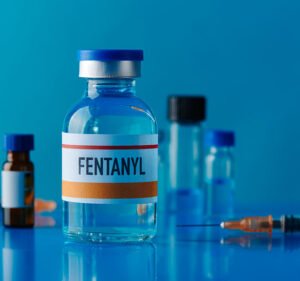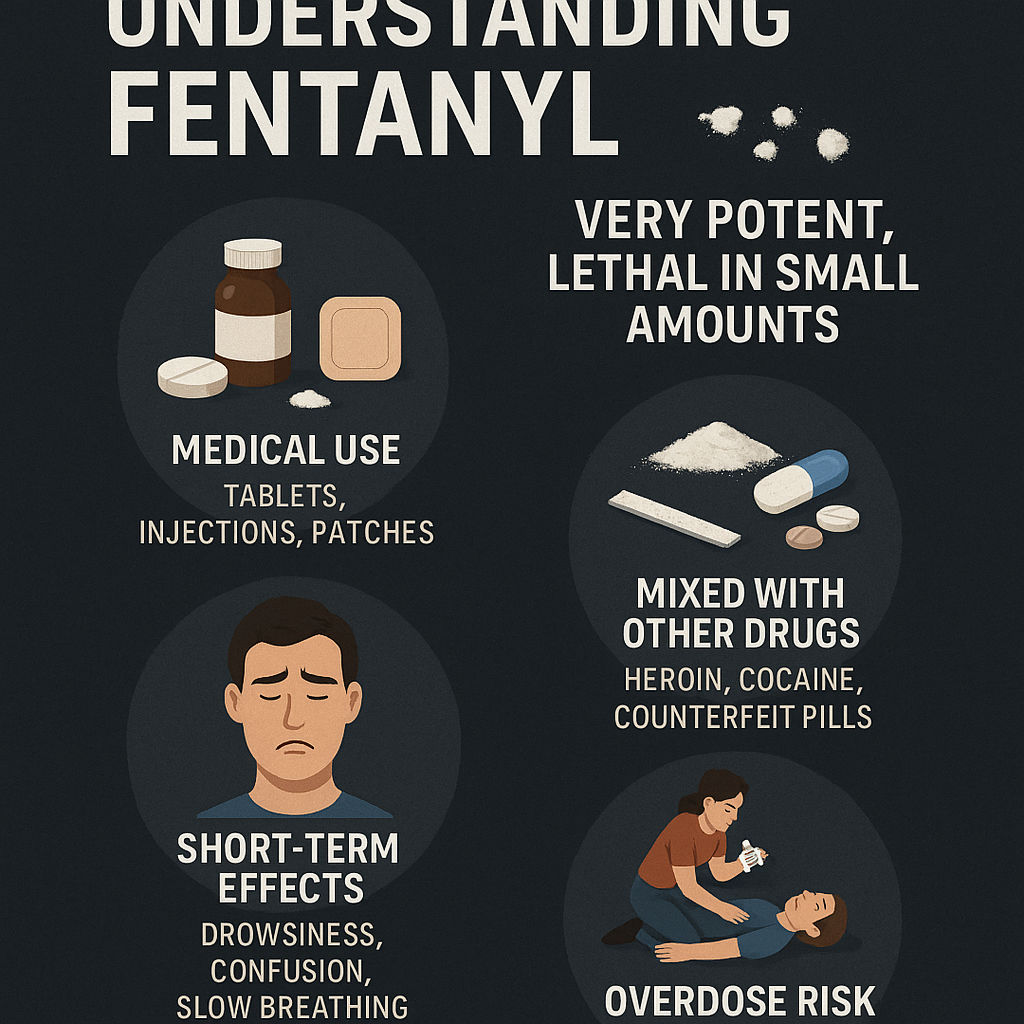Understanding Fentanyl: Dangers, Effects, Overdose, and How to Stay Safe
What Is Fentanyl?
Fentanyl is a synthetic opioid first developed in the 1960s for managing extreme pain. It is used in hospitals for post-surgical recovery, advanced cancer pain, and severe breakthrough pain.
- It is 50 to 100 times more potent than morphine and up to 40 times stronger than heroin (CDC).
- Medical formulations include tablets, injections, and transdermal skin patches.
- Outside medical supervision, fentanyl’s extreme potency makes it highly lethal.
👉 For pharmaceutical-grade fentanyl intended only for authorized use, see Psychedelic2.

How Dangerous Is Fentanyl Compared to Other Opioids?
Fentanyl stands apart from most opioids in terms of overdose risk.
- Morphine vs. Fentanyl: Fentanyl is up to 100 times stronger.
- Heroin vs. Fentanyl: Fentanyl is 20 to 40 times stronger.
- Oxycodone vs. Fentanyl: Even high-dose oxycodone tablets are far less potent. Many counterfeit “oxycodone” pills contain fentanyl, leading to accidental overdoses (DEA).
Because only a few grains of fentanyl can cause death, accidental exposure is common among people who use other drugs.
Why Is Fentanyl So Dangerous?
Key risks include:
- Extreme potency: Even micrograms can cause fatal respiratory depression.
- Hidden presence: Odorless and tasteless, often mixed into heroin, cocaine, or counterfeit pills.
- Rapid onset: Overdose symptoms can appear within two minutes.
Illicit fentanyl is cheap to produce, making it profitable for dealers but deadly for users.
How Does Fentanyl Enter the Drug Market?
Fentanyl on the street often comes from:
- Illegal importation from overseas labs
- Domestic production in unregulated facilities
- Theft of legitimate medical supplies
Cross-contamination during pill pressing is common, so users may be exposed even when dealers did not intend to include fentanyl.
What Are the Short-Term Effects of Fentanyl?
Fentanyl binds to opioid receptors in the brain and spinal cord.
Mental Effects
- Dizziness
- Confusion
- In and out of consciousness
Physical Effects
- Slow or shallow breathing
- Drowsiness
- Nausea and vomiting
- Constricted pupils
- Skin warmth or itching
Overdose effects begin quickly, often in under two minutes.
What Are the Long-Term Effects of Fentanyl Use?
Fentanyl was never intended for long-term daily use. Dependence and health risks escalate rapidly.
Mental Health Effects
- Depression and suicidal thoughts
- Impulsive behavior
- Substance use disorder (NIH)
Physical Health Effects
- Constipation and gastrointestinal damage
- Malnutrition and weight loss
- Menstrual irregularities in women
- Erectile dysfunction in men
- Worsened chronic pain at high doses
Pregnancy Risks
Use during pregnancy can cause:
- Miscarriage
- Premature birth
- Low birth weight
- Neonatal opioid withdrawal syndrome (Health Canada)
What Are Fentanyl Withdrawal Symptoms?
Tolerance develops within weeks. Withdrawal occurs if use stops suddenly.
Common Symptoms
- Cravings
- Anxiety, depression, insomnia
- Vomiting, diarrhea, abdominal pain
- Rapid heartbeat
- Cold sweats and muscle aches
Neonatal Withdrawal
Newborns exposed in the womb may suffer:
- Irritability and excessive crying
- Poor feeding
- Vomiting and diarrhea
- Seizures (in severe cases)
Hospital care is required for infants in withdrawal.
What Are the Signs of Fentanyl Overdose?
Recognizing overdose early saves lives.
- Unresponsiveness
- Very slow or absent breathing
- Gurgling or choking sounds
- Blue lips or fingertips
- Extreme drowsiness or unconsciousness
Can Naloxone Reverse Fentanyl Overdose?
Yes, naloxone (Narcan) can temporarily reverse fentanyl overdose. But:
- Multiple doses may be needed because fentanyl is so potent.
- Effects last 20–90 minutes, so emergency care is still required.
- Immediate medical attention is critical (CDC).
How To Reduce the Risk of Fentanyl Overdose
- Never use opioids alone
- Take small amounts and wait before taking more
- Carry naloxone and train friends or family to use it
- Use supervised consumption sites where available
- Test substances with fentanyl test strips
Fentanyl Test Strips
- Helpful for detecting fentanyl in drugs
- Cannot always detect analogues such as carfentanil
- Not FDA-approved for street use, but widely used in harm reduction programs (CDC)
Is Fentanyl Dangerous to First Responders?
Touching fentanyl is unlikely to cause overdose. According to NIOSH, incidental skin exposure is not a high risk, though gloves and protective equipment are recommended for safety (NIOSH).
Final Thoughts: Staying Safe Around Fentanyl
Fentanyl is one of the strongest opioids ever made. In medical settings, it is effective for severe pain. In the illicit market, it is a leading cause of overdose deaths.
Key points:
- Fentanyl is up to 100 times stronger than morphine
- Overdose can happen in under two minutes
- Naloxone saves lives, but immediate medical help is still required
- Harm reduction strategies reduce risks
For legitimate, authorized use, you can buy pharmaceutical fentanyl safely at Psychedelic2.



7betgame is really cool. The overall vibe is just fun. Definitely worth checking out. Here’s the link for you to enjoy:7betgame.